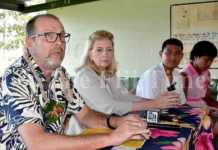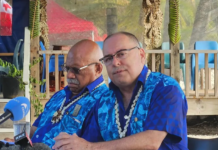The New Zealand Human Rights Commission hosted a discussion on the importance of the United Nations Declaration on the rights of Indigenous Peoples (UNDRIP) as part of a Indigenous Rights Information Series. The panel discussed the process of adopting the UNDRIP in New Zealand, how it affects indigenous peoples in the country and suggestions for implementation. Video: Human Rights Commission
By TJ Aumua in Auckland
Former Māori party co-leader Sir Pita Sharples described te reo Māori as being on “life support” at a Human Rights Commission forum this month.
He said he would lead an initiative of revitalising the Māori language and would hope to encourage the Government in supporting the notion, as a fundamental right in the United Nations Declaration on the rights of Indigenous Peoples (UNDRIP).
“I am determined this year to lead a charge with the Declaration and with the Treaty of Waitangi and for Government to be meaningfully supportive of the growth of te reo Māori in New Zealand.”
‘forbidden’
Sharples talked about his parents who, in the past, were forbidden to talk te reo Māori in New Zealand.
As a result “our language was killed in one generation”.
He told the Pacific Media Centre an environment that would support the learning of the language and its use in everyday conversation needs to be established in New Zealand.
“When our kids go to the mall, they talk Māori the whole time. But the world around them doesn’t support what they are doing.”
Sharples also emphasised that New Zealand media have to be trained in Māori pronunciation in order to foster an environment that encourages and respects te reo.
Indigenous law
Expert member on the UN Permanent Forum of Indigenous Issues Valmaine Toki recommended mandatory indigenous law studies in New Zealand as part of implementing legal understanding of the UNDRIP.
She also said constitutional recognition of the Declaration in New Zealand is key to reflecting indigenous rights.
Listen to the full audio story:
Traditional knowledge
Toki also touched on how indigenous knowledge is key to solving Pacific climate change.
“The Pacific is really vital and key at the moment because of climate change-it’s a huge issue. And traditional knowledge cuts right across that.”
Listen to the interview with Valmaine Toki:










































